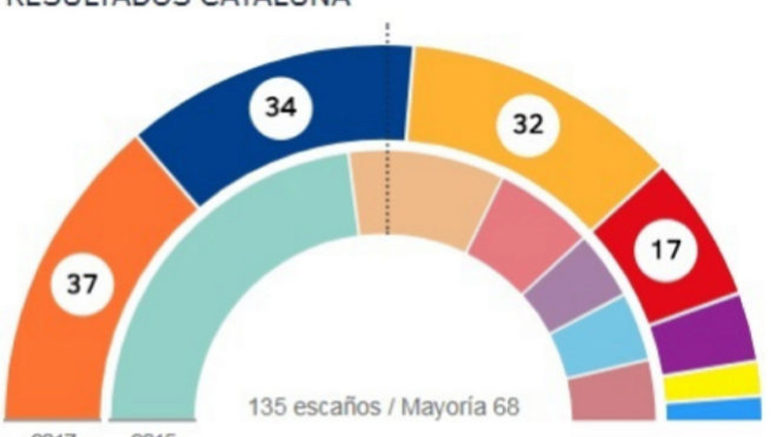► Ciudadanos wins 1.1mn votes, 161,499 more than Puigdemont’s PDeCat party
► Pro-independence parties fail to win 50% of ballots in record voter turnout
► NOTE: This story updated as of 29th December with final vote count & percentages …
Voters in Catalonia went to the polls in a record 79.04 percent regional election turnout Thursday to produce a topsy-turvy result that may lead to weeks of uncertainty as political parties negotiate formation of a working government and Spain’s central government in Madrid struggles to cope with the ongoing political dilemma fueled by pro-independence forces seeking secession from Spain.
A record 82 percent voter turnout set the stage for an unpredictable finish in a race that pre-election voter surveys projected would be neck-and-neck between Catalan parties against and in favor of independence Spain — and the close results did not disappoint pollsters’ projections of a cliffhanger finish.
Catalonia’s seven-year-old, centre-right Ciudadanos party surged ahead of all rivals to win 1.1 million of the overall 4.39 million ballots cast, giving it the largest percentage of votes (25.37) and greatest number of seats (36) in the Catalan Parlament. Other parties campaigning against against Catalonia’s independence from Spain did not perform as well — the Catalan Socialist party picking up only one additional seat in the parliament, while the Podemos-backed Catalunya en Comú-Podem coalition and the conservative Partido Popular of Catalonia losing votes and seats.
Final tabulation of vote share and corresponding seats in Parlament:
► 25.26% | 36 seats | C’s (Ciutadans ~ Ciudadanos)
► 21.58% | 34 seats | JxCat (PDeCat, Partit Demòcrata Europeu Català)
► 21.30% | 32 seats | ERC (Esquerra Republicana de Catalunya)
► 13.81% | 17 seats | PSC-PSOE (Partit dels Socialistes de Catalunya)
► 7.42% | 8 seats | CeC-Podem (Catalunya en Comú-Podem)
► 5.76% | 4 seats | CUP (Candidatura d’Unitat Popular)
► 4.22% | 4 seats | PPC (Partido Popular de Catalunya)
► 0.65% | 0 seats | Other
► 100% | 135 seats | TOTAL
Although the anti-independence parties won a combined 50.71 percent majority of ballots cast Thursday, a regional election system in Catalonia skewed to favor rural and provincial votes over urban votes awarded more seats to pro-independence parties responsible for the region’s 1st October independence referendum in violation of Spain’s Constitution and a subsequent unilateral declaration of independence from Spain.
READ HOW CATALONIA’S ELECTION SYSTEM FAVORS ‘INDEPENDENTISTA’ PARTIES …
Parties who campaigned against independence from Spain:
► 25.26% | 36 seats | C’s (Ciutadans ~ Ciudadanos)
► 13.81% | 17 seats | PSC-PSOE (Partit dels Socialistes de Catalunya)
► 7.42% | 8 seats | CeC-Podem (Catalunya en Comú-Podem)
► 4.22% | 4 seats | PPC (Partido Popular de Catalunya)
► 50.71% | 65 seats | TOTAL
Although the pro-independence parties — Partit Demòcrata Europeu Català (PDeCat, formerly Convergència Democràtica de Catalunya), rivals Esquerra Republicana de Catalunya (ERC) and the far-left Candidatura d’Unitat Popular (CUP) — managed to win a combined 48.64 percent of all ballots cast, Catalonia’s election system awarded them a combined 70 seats in Parlament, five more than their anti-independence rivals and pushing them past the 68-seat majority threshold to enable formation of a new government.
Clearly, were the election to have been a referendum on independence from Spain, the pro-independence parties would have lost and the anti-independence parties would have won with more than 50 percent of the vote.
Parties who campaigned for independence from Spain:
► 21.58% | 34 seats | JxCat (PDeCat, Partit Demòcrata Europeu Català)
► 21.30% | 32 seats | ERC (Esquerra Republicana de Catalunya)
► 5.76% | 4 seats | CUP (Candidatura d’Unitat Popular)
► 48.64% | 70 seats | TOTAL
The ability of the pro-independence parties to form a governing majority is not guaranteed, however, and may be conditioned by the CUP’s declarations during the election campaign that it would not lend its votes to a governing coalition unless both PDeCat and ERC defy the Spanish government and courts and come out firmly in favor of unilateral independence from Spain and formation of a Catalan Republic.
Although all deputies elected to Catalonia’s Parlament on Thursday will now be able to pick up their certificate of election (Acta de Diputado), further complicating things for the pro-independence parties is the fact that eight newly elected deputies from the pro-independence parties will find it difficult if not impossible to cast their ballots on key votes in the new legislature, including election of a new President for Catalonia. Three of the eight, including ERC leader Oriol Junqueras, are in preventive prison outside Madrid for on charges related to their roles in organizing the illegal 1st October referendum, and five — including former Catalan President Carles Puigdemont — are in self-imposed exile in Brussels, having fled Spain to escape their detention on the same charges.
► Read More in Spanish at El Periódico, La Vanguardia and El Mundo …
► Read More in English at AFP, France24 and the BBC …
RELATED STORY: WHAT’S NEXT FOR CATALONIA FOLLOWING REGIONAL ELECTIONS?


